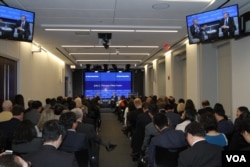The soon-to-be head of the China-led Asian Infrastructure Investment Bank has called the standards and conditions set by some Western countries “excessive conditionality” and promises to build “21st-century governance” at the new bank.
Jin Liqun, former vice president of the Asian Development Bank, was chosen as president-designate of the controversial AIIB bank in August. He is currently visiting the US.
Speaking at a panel at the Brookings Institute in Washington last week, he dismissed Western concerns that the bank would compete with the World Bank and International Monetary Fund.
“The AIIB is not a rival to the World Bank, ADB, or any other [multilateral development banks],” he said. “The leaders use dialogue between AIIB and all these institutions, [which] has been going very smoothly.”
The infrastructure bank was proposed by China and signed on as founding members 21 other countries last year. The development bank is expected to be operational by the end of this year. The AIIB is expected to have starting funds of up to $100 billion and to ease regional demands for infrastructure investment in developing countries like Cambodia, which is a founding member. The ADB has estimated regional demands of such investment to total $8 trillion by 2020.
But civil society groups and Western donors have voiced concerns about possible loose standards, short of the World Bank and ADB levels of governance and accountability, and the potential undermining of good governance and human rights in recipient countries.
Those are reasons Japan and the United States have not joined the bank. But analysts also say the two countries see the new Asia bank as a competitor to regional projects at the ADB and the World Bank. Those concerns have not prevented US allies like the United Kingdom and Australia from joining the AIIB, however. As of September, nearly 60 countries have applied to be members of the bank.
Jin says although China was unable to join the US-led Trans-Pacific Partnership, he welcomes US membership in the new Asia bank. “Even though for some reason China could not be part of TPP,” he said, “the door [is] open for US membership in AIIB.”





